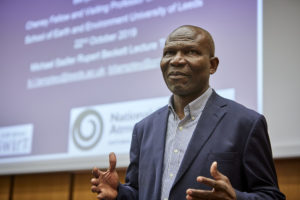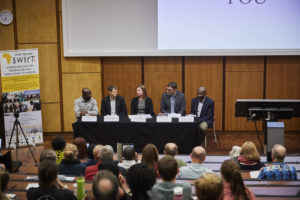There are only a handful of African scholars conducting world-class research in meteorology and climate change – and Dr Benjamin Lamptey is one of them. As a contributor to the Intergovernmental Panel on Climate Change (IPCC), his international reputation is well-established. His move to Leeds as a Cheney Fellow has given the University a highly-respected African voice on climate change and weather, while giving Dr Lamptey time and space to develop his own research.

Douglas Parker, Met Office Professor of Meteorology at the University, has known Dr Lamptey for many years, but their first close collaboration was through the African SWIFT project, a Leeds-led research programme to improve weather forecasts in Africa, funded through the Global Challenges Research Fund (GCRF). Dr Lamptey, then Acting Director General of the African Centre of Meteorological Applications for Development, was the Africa lead researcher for African SWIFT, before becoming a Cheney Fellow in February 2019.
Professor Parker believes the move to Leeds, which has been noted in international circles, has had a positive impact on the University’s reputation for research in the field of meteorology. The influence and connections that Dr Lamptey has within Africa is also having a positive impact on African SWIFT – and for other Leeds GCRF-funded projects that involve research linked to climate change, weather forecasting and land use in Africa.
Providing leadership
With large international projects such as African SWIFT, leading a team of 80-100 people to work effectively together can be very hard, especially across geographical and cultural differences. Dr Lamptey, first as lead researcher for Africa, and then – following his move to Leeds – working side by side with co-lead scientist Professor Parker, has helped to overcome these challenges.
“Ben brings his vision and understanding of the African context, to improve delivery on the ground with our local partners and his engagement and leadership have been invaluable,” says Professor Parker. “Being able to work alongside him in Leeds has helped us move things forward so much faster. Ben is also leading a pilot project in Ghana, looking at how to deliver reliable weather forecasting to farmers, ensuring the models we’re developing can reach the people who need to benefit from them.”
The Cheney Fellowship is also allowing Dr Lamptey to apply his knowledge, expertise and connections to support another African-focused GCRF project based at Leeds – AFRICAP – which aims to make agriculture and food production in Sub-Saharan Africa more productive, sustainable and resilient to climate change.
Dr Lamptey explains. “I coordinated the Diets Impacts Migration Communication (DIMCool) group for a while, and chaired a DIMCool session during the AFRICAP International Workshop in Leeds. The aim was to see how their findings can be used from an African perspective and help them to communicate better with important stakeholders in Africa. Sometimes it’s very practical help: reading a document to see how I understand it, to ensure it’s presented in the right style and format for an African to engage with.”
Making connections
Dr Lamptey is also helping the University to leverage the network created through African SWIFT and another GCRF project called DARA – which provides training in radio astronomy, to help develop a scientific base in this discipline in Africa. The telescopes used for radio astronomy share their engineering and data-processing techniques with the radars used for weather forecasting. Both systems – radio telescopes and weather radars – demand very high levels of technical know-how to keep them operating, with similar skill sets. Dr Lamptey is helping to connect the African meteorology community in Africa with the continent’s fledgling astronomy community. The initial aim is to form a cluster of scientific expertise in Ghana to enable the country to maintain its radio telescope and radar which will provide warnings of severe rainfall.
As well as adding value to Leeds-led research, the Cheney Fellowship has also given Dr Lamptey something important – the time and space to work on his own research.
Ensuring informed decisions
A key project he has now completed looked at the potential for solar energy generation in West Africa. Dr Lamptey used climate models to look at four cities in Niger and Mali, to identify which have the most potential to generate solar energy and assess how climate change would affect that potential.

While at Leeds, he has also been overseeing the validation of two seasonal forecasting systems, in use in other parts of the world, to determine how well they perform across the African continent. The aim is to see where within Africa each one works best in providing accurate seasonal predictions, complementing African SWIFT which focuses on short-term weather forecasting.
Dr Lamptey is passionate about the need for strong science to underpin African decision-making on climate change and this was the subject of his public lecture, conducted as part of his Cheney Fellowship.
“In Africa, we are already seeing more intense floods and droughts, but attributing this purely to climate change is complex,” he says. “Africa’s emissions are low, but changes in land use and land degradation also contribute to extreme weather events. We need the science to inform regional and national policies and strategies to reduce emissions and mitigate climate change. But we also need better infrastructure, particularly around weather forecasting, to help us understand when this extreme weather might occur and minimise their impacts on society, environment and the economy.”
About the Cheney Fellowship
The Cheney Fellowship is a fellowship programme established thanks to a generous donation of £2.5m made by Bacteriology and Biochemistry graduate Peter Cheney and his wife Susan to the University of Leeds. Thanks to the fellowship outstanding scholars, like Dr Benjamin Lamptey, from around the globe are able to move to Leeds and to develop their research at the University. More information about Peter and Susan Cheney Fellowship can be read here.
